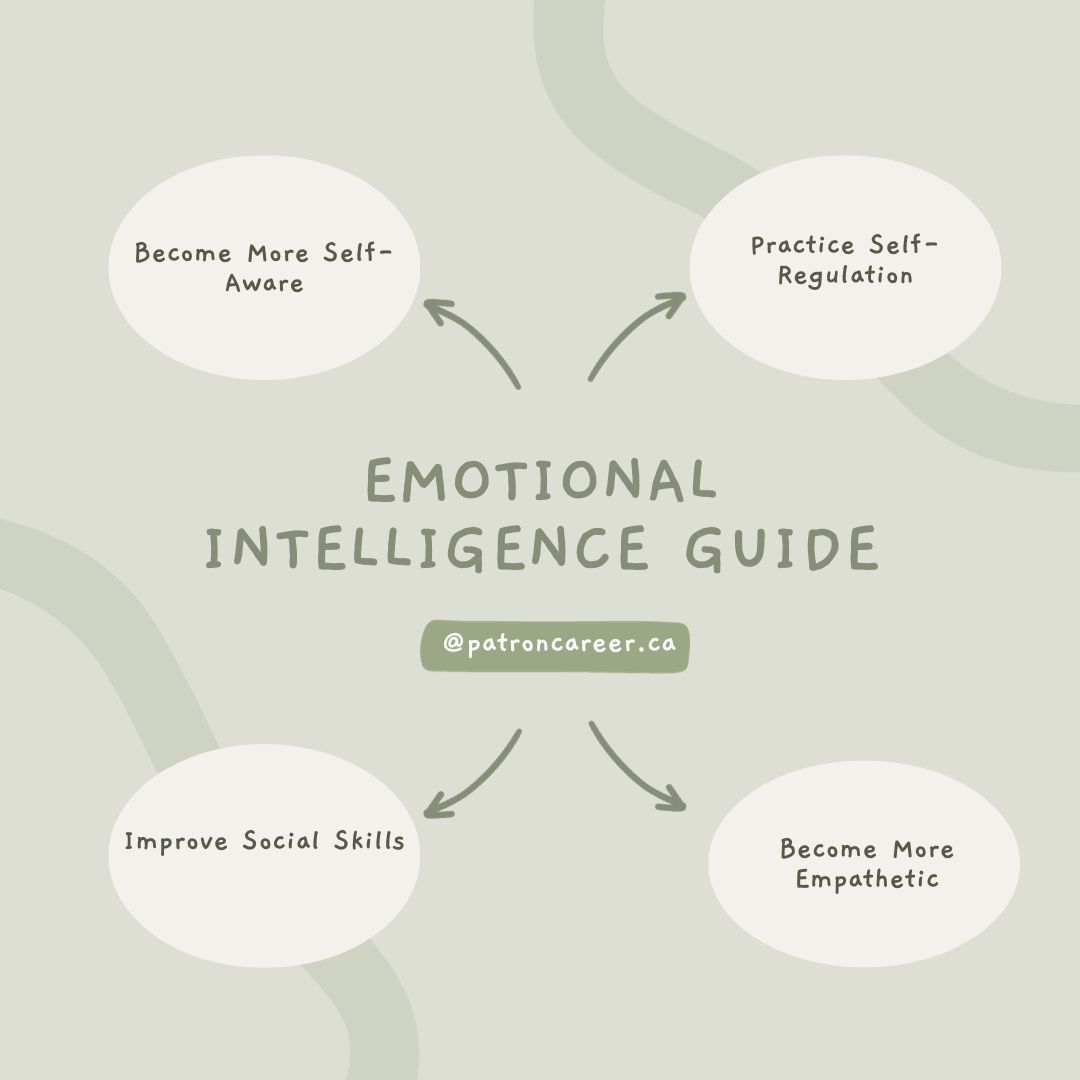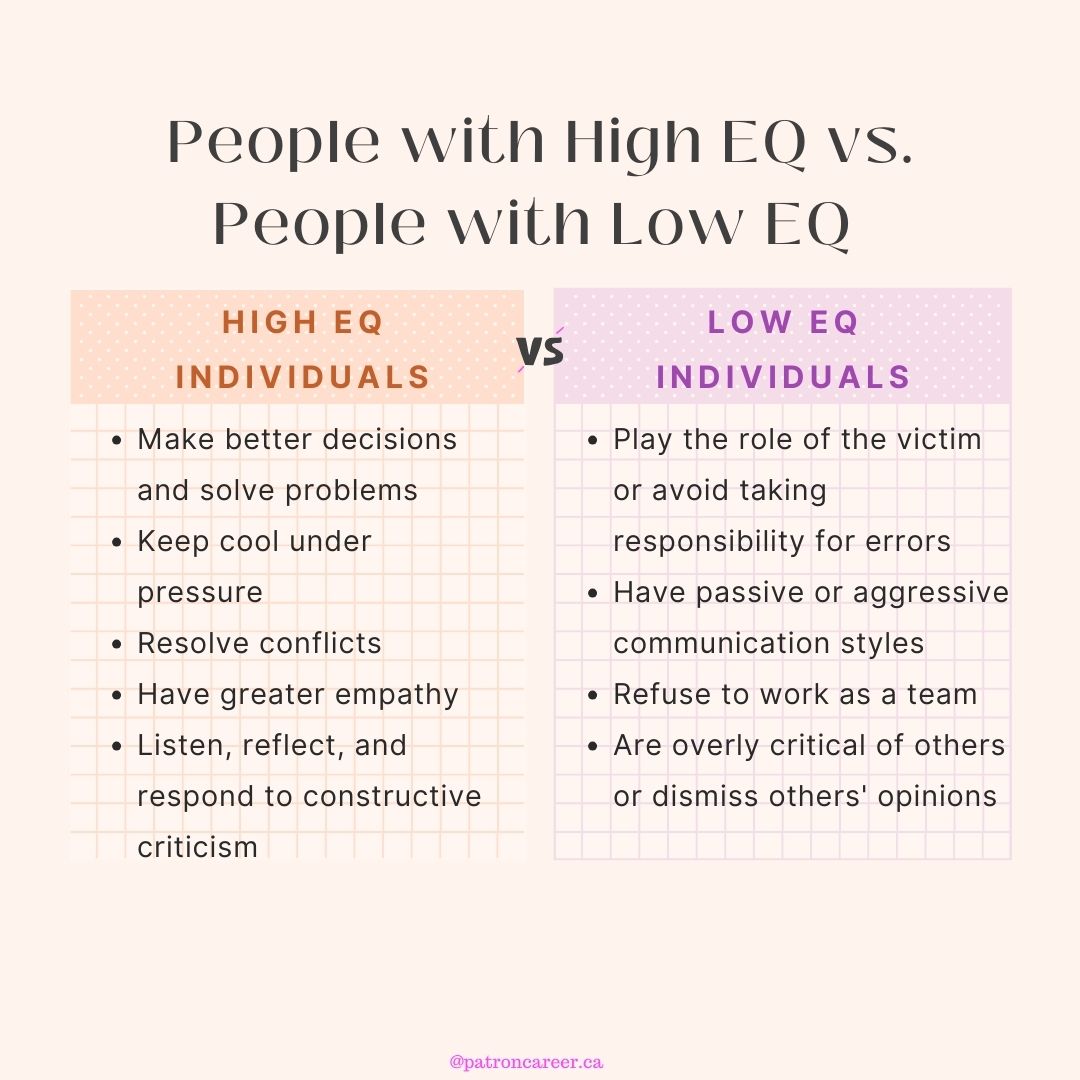
Top Candidate Experience
27 June, 2024
Patron Career Staffing firmly believes in adopting a tailored approach to meet temporary and permanent recruitment needs. We safeguard the interest of our clients by finding such workers who are knowledgeable and reliable.
About UsNeed help? Make a Call
32 Dundas Street East Unit A, L5A1W2

ABSTRACT- Succeeding in the workplace may not always require strenuous efforts, but a simple protocol of boosting one’s emotional intelligence can heavily impact the job. Learn the critical role of EI in effective communication, conflict resolution, leadership, stress management, and decision-making at work. Discover the five key components of EI and gain valuable insights into its development. Learn how to boost your self-awareness, self- regulation, empathy, social skills, and motivation, and set SMART goals for personal and professional growth. Don't miss this opportunity to harness the power of EI to advance your career. Read our blog now to unlock your full potential in the workplace!
Emotional intelligence, if developed rightly, can move mountains and fight repulsive behaviours. The world of business being interconnected and people-oriented is no longer just about technical skills and qualifications. The ability to be in touch with your emotions and that of others, to manage fleeting emotions and to be self-aware are keys to a thriving career. Emotional intelligence (EI), a.k.a. Emotional Quotient (EQ) is an intangible asset that deeply affects one's roles in the workplace.
Understanding, regulating and honing emotional intelligence can give an edge to individuals looking to surpass professional outcomes.
By going through PCS’s blog on- The Role of Emotional Intelligence in the Workplace, you will be able to:
Starting off, let us dive into the meaning of emotional intelligence in the workplace
Emotional Intelligence, Defined
Psychologists have referred to emotional intelligence as one's ability to recognize, understand, manage, and leverage emotions in a professional setting. It involves being aware of your own emotions and the emotions of others and using this awareness to make informed decisions, communicate effectively, build relationships, and navigate the complexities of the workplace.
Recent newsletter: 3 Ways to Set Effective Performance Goals for Your Career
Here’s a more detailed precept on what EI encompasses:
Components of EI
Understanding and leveraging how emotional intelligence operates in the workplace is crucial for individuals looking to succeed over time:

1. Self-awareness:
2. Self-regulation:
3. Motivation:
4. Empathy:
Related: 7 Tips for Fostering Workplace Connections
5. Social Skills:
4. Compliance and Regulation
Emotional intelligence in the workplace impacts nearly every aspect of your professional life. It enables you to communicate more effectively, manage your emotions under pressure, resolve conflicts, inspire and lead teams, and make balanced, well-informed decisions.
One should abide by dwelling on their EI persistently for a desired result. Follow and imbibe below mentioned practices in your routine:

1. Practice Self-awareness
Start by paying attention to your own emotions and reactions in different situations. Keep a journal to track your feelings and responses, helping you become more self-aware.
2. Develop Self-regulation
Practice self-control by identifying your triggers and finding healthy ways to manage your emotions. Techniques such as deep breathing and mindfulness can be incredibly effective.
Read more: How to Deal with Workplace Negativity.
3. Cultivate Empathy
Improve your empathy by actively listening to others, trying to understand their perspectives, and showing genuine care for their feelings. This will help you build stronger relationships in the workplace.
4. Enhance Social Skills
Work on your communication, conflict resolution, and team-building skills . Seek feedback from colleagues and participate in group activities to improve your social intelligence.
5. Set Goals
Set specific, measurable, achievable, relevant, and time-bound (SMART) goals to motivate yourself and stay focused on personal and professional growth.
Words That Matter…
Incorporating these practices into your daily work routine can have a significant impact on your emotional intelligence and, consequently, your career success.
To route up for success, enhancing your overall mental well-being is quintessential to upgrading yourself and your work performance. Emotional intelligence is not only a catchphrase in workplace settings nowadays, but a vital ingredient to accomplish work goals. As an employee of the workplace, you’re a human being first, find new and effective ways to daily nourish your emotional quotient as much as you willingly put in the effort to improve your Intelligence Quotient (IQ). Religiously follow the art of emotional intelligence and watch yourself get the best of both worlds at once!
Explore more blogs from Patron Career Staffing, here.
